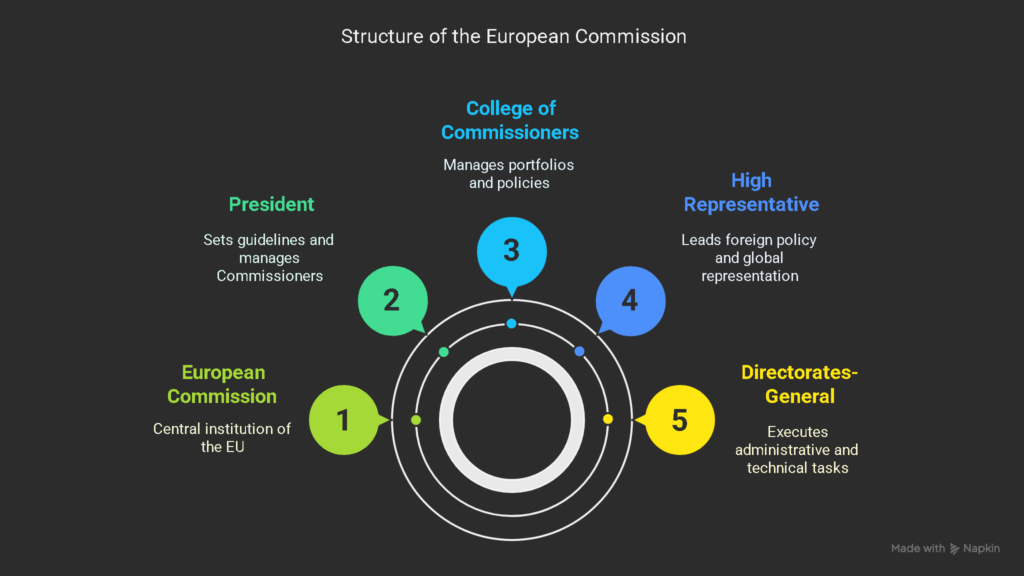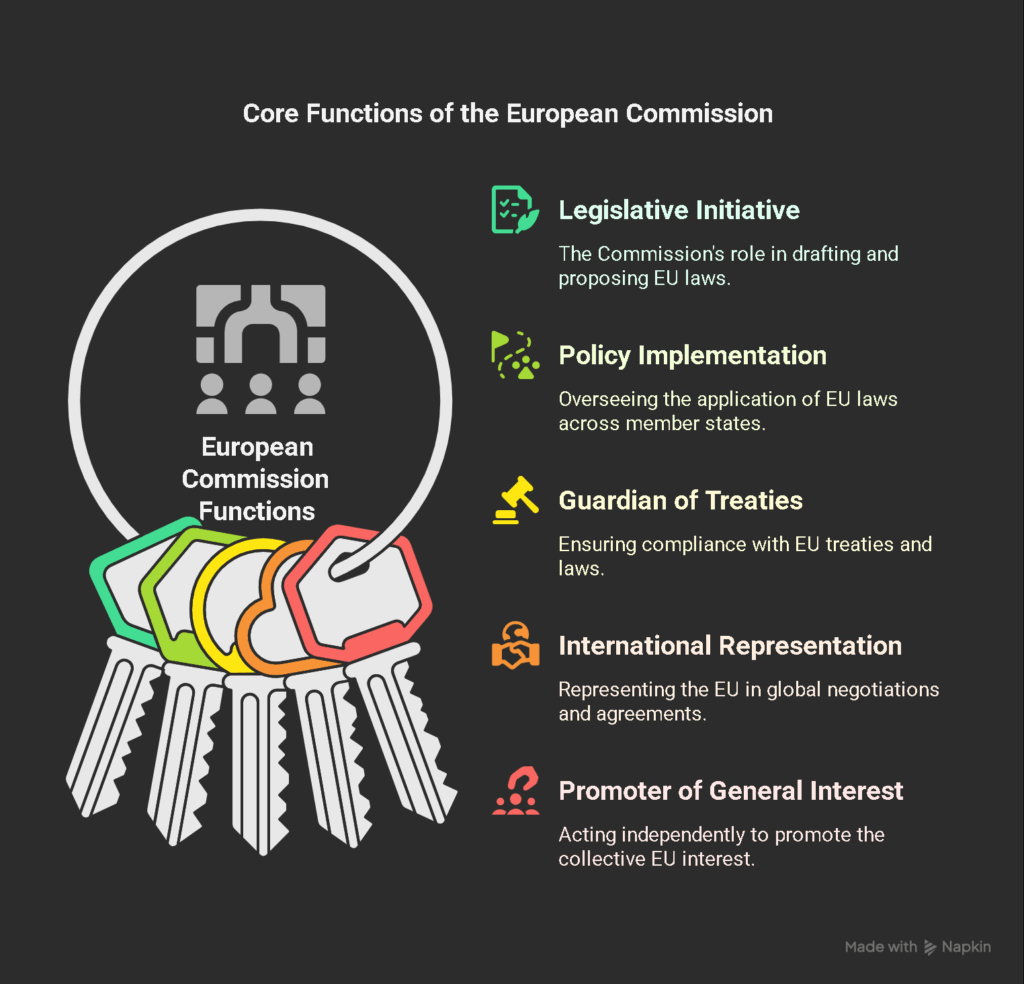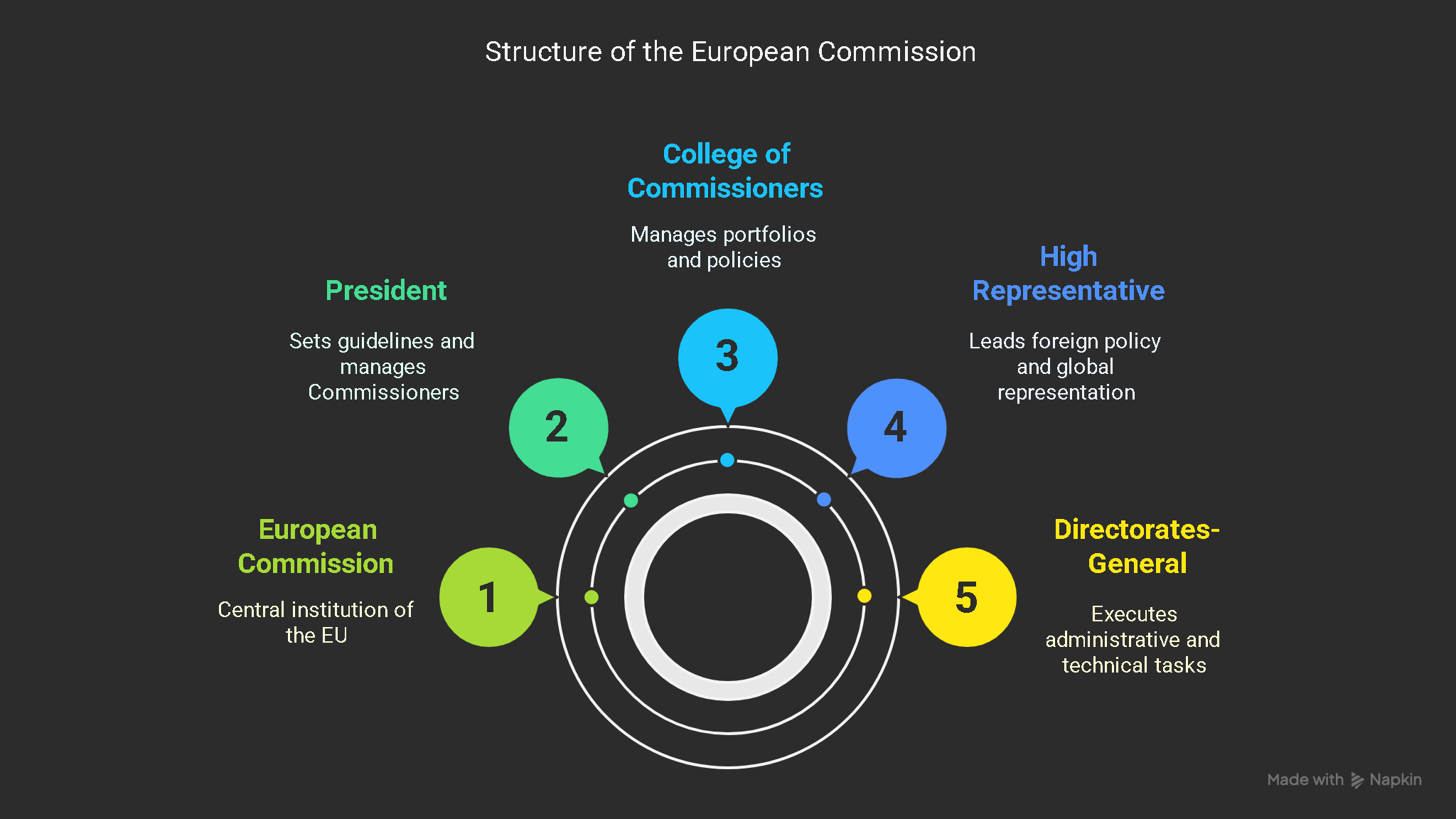The European Commission is one of the principal institutions of the European Union (EU), often regarded as the executive arm of the EU. It plays a pivotal role in initiating legislation, implementing policies, managing the budget, and representing the Union internationally. Functioning somewhat akin to a government cabinet, the Commission holds significant authority and responsibility in the day-to-day operations of the EU, though it operates within a framework of accountability to other EU bodies, particularly the European Parliament and the Council of the European Union.
I. Composition of the European Commission
The composition of the Commission reflects its unique nature as a supranational institution with representation from all member states while striving to uphold the general interest of the Union as a whole.
- President of the European Commission:
- The President is nominated by the European Council and elected by the European Parliament.
- The President sets the political guidelines of the Commission, allocates portfolios among the Commissioners, and can request a Commissioner’s resignation.
- The current President (as of 2025) is Ursula von der Leyen (since 2019), though leadership may change based on European Parliament elections.
- College of Commissioners:
- There is one Commissioner per member state, including the President and the High Representative for Foreign Affairs and Security Policy, making a total of 27 Commissioners.
- Each Commissioner is assigned a portfolio (e.g., trade, environment, energy, digital economy) akin to ministerial responsibilities.
- Commissioners are appointed for a five-year term, and they are individually vetted by the European Parliament before the entire College is subject to a vote of approval.
- High Representative of the Union for Foreign Affairs and Security Policy:
- Serves concurrently as a Vice-President of the Commission.
- Leads the EU’s foreign and security policy and represents the EU on the global stage.
- Coordinates the EU’s external actions in conjunction with the European External Action Service (EEAS).
- Directorates-General (DGs) and Services:
- The administrative and technical work of the Commission is carried out by Directorates-General, which function similarly to national ministries.
- DGs are staffed by permanent EU civil servants and are headed by Directors-General.

II. Functions of the European Commission
The European Commission performs a wide range of functions that are foundational to the operation and integration of the European Union. Its primary functions are as follows:
- Legislative Initiative:
- The Commission holds the exclusive right to initiate legislation in most policy areas.
- It drafts legislative proposals and submits them to the European Parliament and the Council of the EU for approval.
- These proposals are usually based on treaties, public consultations, expert opinions, and impact assessments.
- Policy Implementation and Budget Management:
- Once legislation is adopted, the Commission oversees its implementation, often in coordination with national governments.
- It ensures that EU law is applied uniformly across member states.
- The Commission also prepares and manages the EU’s annual budget and ensures financial resources are used according to agreed policies and rules.
- Guardian of the Treaties:
- The Commission ensures that member states comply with EU treaties and laws.
- If a state fails to fulfill its obligations, the Commission can initiate infringement proceedings and refer the case to the European Court of Justice (ECJ).
- This role is crucial in maintaining the integrity and uniformity of EU law.
- Representation of the EU in International Affairs:
- The Commission represents the EU in trade negotiations, environmental agreements, development cooperation, and enlargement talks.
- It negotiates international agreements on behalf of the EU, especially in areas under exclusive EU competence (e.g., customs union, common commercial policy).
- The High Representative often plays a lead role in foreign and security policy representation.
- Promoter of the General Interest of the Union:
- Commissioners are expected to act independently of national governments and promote the collective interest of the EU.
- They are bound by the principles of collegiality, solidarity, and independence.

Conclusion
The European Commission serves as the engine of European integration, ensuring that EU legislation is proposed, enforced, and effectively implemented. Its unique structure—with Commissioners drawn from each member state but pledged to the Union’s interest—reflects the EU’s sui generis nature: neither a nation-state nor a traditional international organization. Through its legislative, executive, and oversight functions, the Commission plays an indispensable role in sustaining the complex and evolving architecture of the European Union.
The Commission’s effectiveness, however, is often subject to scrutiny. Concerns over the “democratic deficit”, lack of direct electoral accountability, and the influence of larger member states occasionally surface in academic and political debates. Nonetheless, as the institutional heart of the EU, the Commission continues to shape the Union’s future in a rapidly changing global landscape.








Leave a Reply